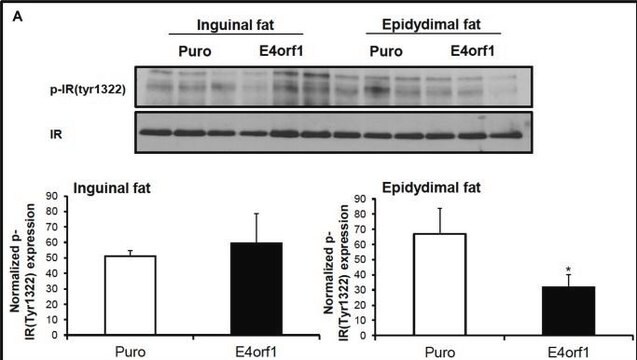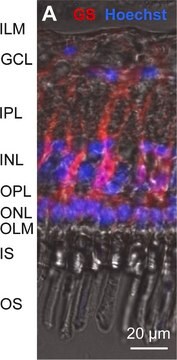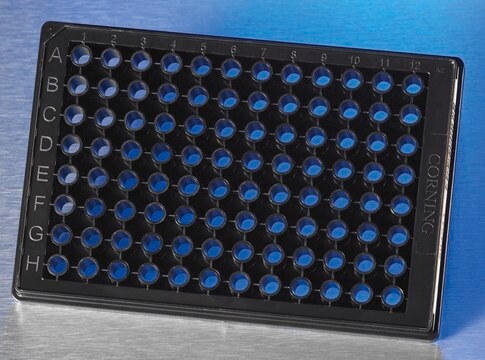I1783
Anti-phospho-Insulin Receptor (IR) (pTyr972) antibody produced in rabbit
affinity isolated antibody, buffered aqueous solution
Sign Into View Organizational & Contract Pricing
All Photos(1)
About This Item
Recommended Products
biological source
rabbit
Quality Level
conjugate
unconjugated
antibody form
affinity isolated antibody
antibody product type
primary antibodies
clone
polyclonal
form
buffered aqueous solution
species reactivity
human, mouse
UniProt accession no.
shipped in
dry ice
storage temp.
−70°C
target post-translational modification
phosphorylation (pTyr972)
Gene Information
human ... INSRR(3645)
mouse ... Insr(16337)
General description
The biological effects of insulin are mediated by insulin receptor (IR) and IGF-1 receptor. Insulin receptor consists of two α and two β subunits, each subunit has a tyrosine kinase domain. Signaling by IR is important in cell proliferation and metabolism of glucose. Insulin receptor activates the PI3K/Akt and the FKHR pathway, thereby regulates metabolism and insulin-dependent gene expression. Tyrosine 972 is an autophosphorylation site that is present in the juxtamembrane domain. Phosphorylation at Tyr972 is required for interaction of IR with its intracellular substrates and increases the stability of IR and substrate complexes. Overexpression of IR has been observed in breast cancer tissue and is implicated in proliferation of breast cancer cells, hyperinsulinemia and insulin resistance. IR can also bind IGF-I and IGF-II with decreased affinity
Anti-phospho-IR (pTyr972) recognizes human and mouse IR phosphorylated on tyrosine 972. It may cross react with IGF-1R.
Anti-phospho-IR (pTyr972) recognizes human and mouse IR phosphorylated on tyrosine 972. It may cross react with IGF-1R.
Specificity
This antibody may also have cross-reactivity with phosphosphorylated insulin-like growth factor-1 receptor (IGF-1R).
Immunogen
phosphopeptide derived from the region of human insulin receptor (IR) that contains tyrosine 972.
Physical form
Solution in Dulbecco′s phosphate buffered saline (without Mg2+ and Ca2+), pH 7.3, 50% glycerol with 1 mg/ml of bovine serum albumin and 0.05% sodium azide.
Disclaimer
Unless otherwise stated in our catalog or other company documentation accompanying the product(s), our products are intended for research use only and are not to be used for any other purpose, which includes but is not limited to, unauthorized commercial uses, in vitro diagnostic uses, ex vivo or in vivo therapeutic uses or any type of consumption or application to humans or animals.
Not finding the right product?
Try our Product Selector Tool.
Storage Class Code
10 - Combustible liquids
WGK
WGK 3
Flash Point(F)
Not applicable
Flash Point(C)
Not applicable
Personal Protective Equipment
dust mask type N95 (US), Eyeshields, Gloves
Choose from one of the most recent versions:
Already Own This Product?
Find documentation for the products that you have recently purchased in the Document Library.
V Papa et al.
The Journal of clinical investigation, 86(5), 1503-1510 (1990-11-01)
The growth of breast cancer cells is under the regulation of hormones, growth factors, and their receptors. In the present study, we have employed a new, sensitive, and specific radioimmunoassay for the direct measurement of insulin receptors in surgical specimens
Y Kido et al.
The Journal of clinical endocrinology and metabolism, 86(3), 972-979 (2001-03-10)
The pleiotropic actions of insulin are mediated by a single receptor tyrosine kinase. Structure/function relationships of the insulin receptor have been conclusively established, and the early steps of insulin signaling are known in some detail. A generally accepted paradigm is
V Papa et al.
Trends in endocrinology and metabolism: TEM, 8(8), 306-312 (2008-04-15)
It is commonly believed that the insulin receptor mainly mediates the metabolic effects of insulin, whereas the closely related IGF-I receptor is considered a major factor for the regulation of cell proliferation. Experimental and epidemiological evidence indicates, however, that insulin
Shailendra P Singh et al.
Journal of immunology (Baltimore, Md. : 1950), 201(5), 1491-1499 (2018-07-25)
A link between obesity and periodontitis has been suggested because of compromised immune response and chronic inflammation in obese patients. In this study, we evaluated the anti-inflammatory properties of Kavain, an extract from Piper methysticum, on Porphyromonas gingivalis-induced inflammation in
Antonino Belfiore et al.
Endocrine-related cancer, 18(4), R125-R147 (2011-05-25)
The widespread epidemic of obesity and type 2 diabetes has raised concern for the impact of these disorders as risk factors for cancer and has renewed the interest for studies regarding the involvement of hyperinsulinemia and insulin receptor (IR) in
Our team of scientists has experience in all areas of research including Life Science, Material Science, Chemical Synthesis, Chromatography, Analytical and many others.
Contact Technical Service








